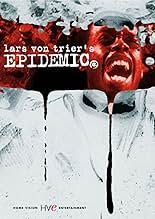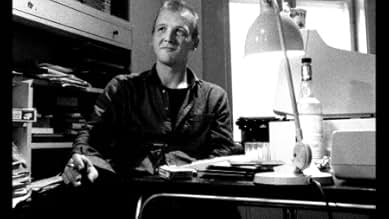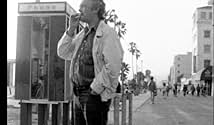IMDb रेटिंग
5.9/10
6.5 हज़ार
आपकी रेटिंग
एक निर्देशक और पटकथा लेखक एक स्क्रिप्ट को कलमबद्ध करते हैं और इस प्रक्रिया में, कल्पना और वास्तविकता के बीच की रेखा को धुंधला करते हैं.एक निर्देशक और पटकथा लेखक एक स्क्रिप्ट को कलमबद्ध करते हैं और इस प्रक्रिया में, कल्पना और वास्तविकता के बीच की रेखा को धुंधला करते हैं.एक निर्देशक और पटकथा लेखक एक स्क्रिप्ट को कलमबद्ध करते हैं और इस प्रक्रिया में, कल्पना और वास्तविकता के बीच की रेखा को धुंधला करते हैं.
- पुरस्कार
- कुल 1 नामांकन
फ़ीचर्ड समीक्षाएं
Epidemic (1987), directed by Lars von Trier, is a meta-cinematic exploration of the blurred line between fiction and reality. The film follows a director and screenwriter who, while working on a script about a plague, find themselves caught up in a real-life epidemic, mirroring the events they are writing. This film is a challenging and unconventional piece of work, characteristic of von Trier's early style, marked by its fragmented narrative and philosophical underpinnings.
The performances are fittingly restrained, with Allan De Waal and Ole Ernst bringing a sense of detachment and intellectual depth to their characters, reflecting the film's thematic concerns. The film's low-budget aesthetic, with shaky handheld camerawork and raw sound design, serves to reinforce the sense of chaos and uncertainty that permeates the narrative. It's a deliberate stylistic choice that enhances the surreal, almost documentary-like atmosphere, but it may be off-putting to some viewers who prefer more polished filmmaking.
Von Trier's direction is methodical, and while the premise of the film offers intriguing possibilities, the execution can feel disjointed and unclear at times. The dialogue often veers into abstract territory, and the narrative structure is fragmented, leaving viewers to piece together the meaning behind the events. The film's slow pace, combined with its minimalistic style, can make it feel like a deliberately inaccessible work, challenging the audience's patience.
Epidemic is a film that operates on multiple levels, blending political, artistic, and existential commentary with a quasi-documentary style. While it offers some thought-provoking moments, it struggles to maintain coherence and impact over its runtime. It is best suited for those interested in avant-garde cinema or those looking to delve into the early works of Lars von Trier, but casual viewers may find it frustrating.
Rating: 6/10. A provocative, if uneven, exploration of the intersection between art, reality, and societal collapse.
The performances are fittingly restrained, with Allan De Waal and Ole Ernst bringing a sense of detachment and intellectual depth to their characters, reflecting the film's thematic concerns. The film's low-budget aesthetic, with shaky handheld camerawork and raw sound design, serves to reinforce the sense of chaos and uncertainty that permeates the narrative. It's a deliberate stylistic choice that enhances the surreal, almost documentary-like atmosphere, but it may be off-putting to some viewers who prefer more polished filmmaking.
Von Trier's direction is methodical, and while the premise of the film offers intriguing possibilities, the execution can feel disjointed and unclear at times. The dialogue often veers into abstract territory, and the narrative structure is fragmented, leaving viewers to piece together the meaning behind the events. The film's slow pace, combined with its minimalistic style, can make it feel like a deliberately inaccessible work, challenging the audience's patience.
Epidemic is a film that operates on multiple levels, blending political, artistic, and existential commentary with a quasi-documentary style. While it offers some thought-provoking moments, it struggles to maintain coherence and impact over its runtime. It is best suited for those interested in avant-garde cinema or those looking to delve into the early works of Lars von Trier, but casual viewers may find it frustrating.
Rating: 6/10. A provocative, if uneven, exploration of the intersection between art, reality, and societal collapse.
I like Von Trier's films and this one and "The Idiots" seem to me the ones in which he achieves through both the way they are shot and the plot in itself, a high quality of personal artistic expression.
Concentrating on "Epidemic", I think the contrast between the black and white parts and the "story" is intriguing and effective, visually disturbing and helping to create the symbolic meaning the viewer could take from this movie.
To me, beyond more evident interpretations about predestination, Dreyer-like bad and evil explanations, I believe Von Trier -with the help of, for instance, bleak houses, rundown sourroundings and disease- tries to tell us that the world we're living is infected by a growing disease, living its marks in EACH ONE OF US, making Europe in general a dull and heartless place to live, a world killing us very slowly and with it our soul, our sensibility and our ability to feel. Like the final song : "we all fall down".
Against the complacency and cynism of much of the cultural expression nowadays, I think Von Trier's work is an exemple. That is why I recommend "Epidemic" to IMDB users.
Concentrating on "Epidemic", I think the contrast between the black and white parts and the "story" is intriguing and effective, visually disturbing and helping to create the symbolic meaning the viewer could take from this movie.
To me, beyond more evident interpretations about predestination, Dreyer-like bad and evil explanations, I believe Von Trier -with the help of, for instance, bleak houses, rundown sourroundings and disease- tries to tell us that the world we're living is infected by a growing disease, living its marks in EACH ONE OF US, making Europe in general a dull and heartless place to live, a world killing us very slowly and with it our soul, our sensibility and our ability to feel. Like the final song : "we all fall down".
Against the complacency and cynism of much of the cultural expression nowadays, I think Von Trier's work is an exemple. That is why I recommend "Epidemic" to IMDB users.
10ooeht
Of course, you gotta be a masochist to enjoy some people's genius - you know that if you bear with them they will take you to new levels of perception.
With Lars von Trier, the voyage is often hilarious. Epidemic is funny. Funny, in a Gummo kind of way: the characters are real, reality is eerie, and we laugh to break the tension; funny in a the characters say amusing things kind of way (preacher: "this bible is in goddamned Latin"); and funny in an Andy Kaufman screwing with the audience (yes, you) kind of way.
Make no mistake: you will suffer. If you are afraid, stay away from horror movies, ya pansy!
This movie also features some great aesthetic distance! It's bold!
With Lars von Trier, the voyage is often hilarious. Epidemic is funny. Funny, in a Gummo kind of way: the characters are real, reality is eerie, and we laugh to break the tension; funny in a the characters say amusing things kind of way (preacher: "this bible is in goddamned Latin"); and funny in an Andy Kaufman screwing with the audience (yes, you) kind of way.
Make no mistake: you will suffer. If you are afraid, stay away from horror movies, ya pansy!
This movie also features some great aesthetic distance! It's bold!
I obviously was in the right mood, since I don't give it a horrible mark. I do give it a 6 out of 10, because it is obviously such a low budget movie and it's definitely very original, but other than that, I am still amazed I watched it till the end.
Two screenwriters are trying to do in 5 days what they barely succeeded in one and a half years, that is write a script. They lost their original screenplay, which by now they can barely remember how it started, due to a bad disk. Each day is accompanied with scenes of their creative process, scenes from the movie they would do and dialogues with different people.
Now it happens that I've just written an IMDb comment that said "Funny little things: Udo Kier plays a short role in this movie, and he is really young". Deja vu! Udo Kier plays in this one, as well.
The movie is shot in black and white, probably by the same single camera, and the sound is almost not processed giving the whole movie a documentary like feeling. There are a lot of things written between the lines, the satire of the government and film industry being the most obvious.
Conclusion: you should watch this mostly if you're Danish. Else if you are a movie critic or deep into films. It is NOT a horror movie. A movie that has some gore at the very end is not horror. And also you have to have the right set of mind to watch it.
Two screenwriters are trying to do in 5 days what they barely succeeded in one and a half years, that is write a script. They lost their original screenplay, which by now they can barely remember how it started, due to a bad disk. Each day is accompanied with scenes of their creative process, scenes from the movie they would do and dialogues with different people.
Now it happens that I've just written an IMDb comment that said "Funny little things: Udo Kier plays a short role in this movie, and he is really young". Deja vu! Udo Kier plays in this one, as well.
The movie is shot in black and white, probably by the same single camera, and the sound is almost not processed giving the whole movie a documentary like feeling. There are a lot of things written between the lines, the satire of the government and film industry being the most obvious.
Conclusion: you should watch this mostly if you're Danish. Else if you are a movie critic or deep into films. It is NOT a horror movie. A movie that has some gore at the very end is not horror. And also you have to have the right set of mind to watch it.
"Epidemic" is, at its heart of hearts, a movie about making movies. As such it challenges the relation between fiction and reality. The two are not statically established realms, self contained in their clearly contained functional domains but they are dynamically interacting at all levels and at all times. The result is a movie in which the narrative structure is dual and of a meandering nature, climaxing in what could be a merge between a programmed project that involves human intellectual intervention- the movie within the movie- and the outbreak of a natural phenomenon with its catastrophic consequences- the epidemic.
Styllistically, "Epidemic" is very much a Lars Trier movie and it shows. From the apparently disconnected flow of scenes to mix of gritty realism with allegory, the director imprints his very personal mark in all elements of "Epidemic". Its very structure attests to this and the imagery reflects it in a very overt manner. "Epidemic" seems to be a playing ground of sorts in which Lars von Trier experiments as much as possible and in trying different things creates a diverse mismatch of scenes that not always work completely well together although they create an atmosphere.
As the process of coalescence between "fiction" and "reality" (this reality being, of course, fictional in itself which adds another layer of complexity and challenges the very notion of the third and fourth walls) heightens the narrative frame shrinks from the stage that is Europe to a small room. The claustrophobia of the later phase of the movie bring the full impact of the plague to the viewer's attention via a limited sample of the population that permits a personal experience of it all.
Much like Bergman's "The Seventh Seal", the plague in question is to be read on many levels and very much like the Swedish director's movie, "Epidemic" is not for everyone. Those who find it interesting, however, may have a strangely riveting experience upon watching this clearly unconventional movie that pushes many borders even if does not do so in a completely coherent manner.
Styllistically, "Epidemic" is very much a Lars Trier movie and it shows. From the apparently disconnected flow of scenes to mix of gritty realism with allegory, the director imprints his very personal mark in all elements of "Epidemic". Its very structure attests to this and the imagery reflects it in a very overt manner. "Epidemic" seems to be a playing ground of sorts in which Lars von Trier experiments as much as possible and in trying different things creates a diverse mismatch of scenes that not always work completely well together although they create an atmosphere.
As the process of coalescence between "fiction" and "reality" (this reality being, of course, fictional in itself which adds another layer of complexity and challenges the very notion of the third and fourth walls) heightens the narrative frame shrinks from the stage that is Europe to a small room. The claustrophobia of the later phase of the movie bring the full impact of the plague to the viewer's attention via a limited sample of the population that permits a personal experience of it all.
Much like Bergman's "The Seventh Seal", the plague in question is to be read on many levels and very much like the Swedish director's movie, "Epidemic" is not for everyone. Those who find it interesting, however, may have a strangely riveting experience upon watching this clearly unconventional movie that pushes many borders even if does not do so in a completely coherent manner.
क्या आपको पता है
- क्रेज़ी क्रेडिटThe film's title appears in red letters in the upper left corner of the screen for the entire length of the film.
- कनेक्शनFeatured in The Making of 'Europa' (1991)
- साउंडट्रैकTannhäuser (The Overture)
Composed by Richard Wagner
टॉप पसंद
रेटिंग देने के लिए साइन-इन करें और वैयक्तिकृत सुझावों के लिए वॉचलिस्ट करें
- How long is Epidemic?Alexa द्वारा संचालित
विवरण
बॉक्स ऑफ़िस
- दुनिया भर में सकल
- $938
- चलने की अवधि1 घंटा 46 मिनट
- रंग
- ध्वनि मिश्रण
- पक्ष अनुपात
- 1.66 : 1
इस पेज में योगदान दें
किसी बदलाव का सुझाव दें या अनुपलब्ध कॉन्टेंट जोड़ें




















